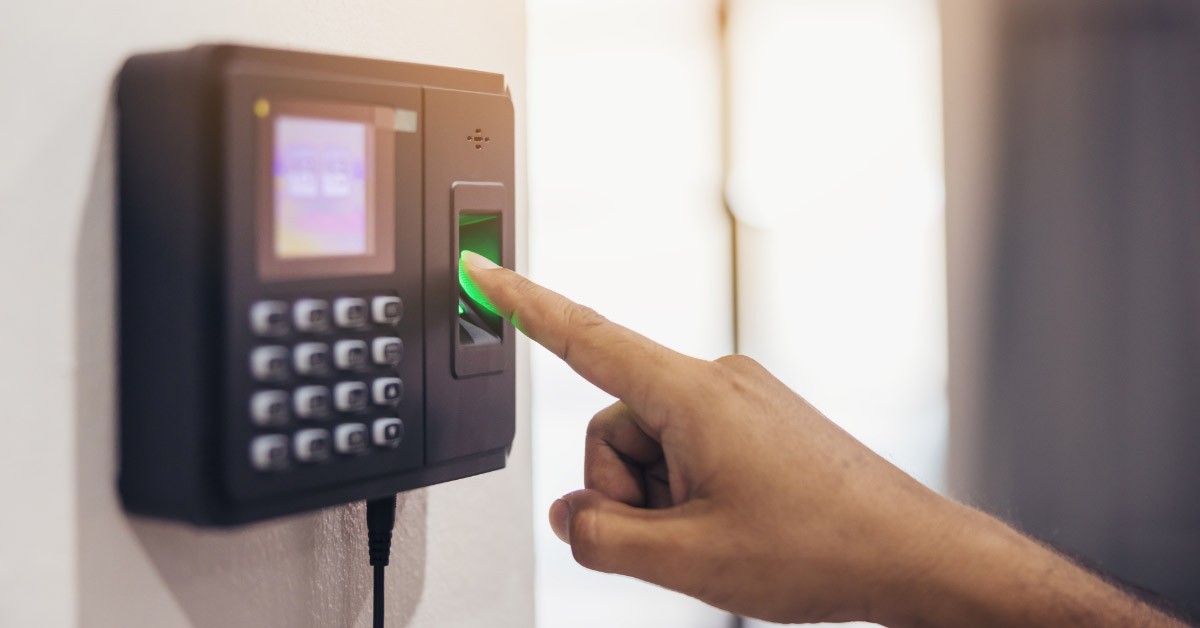A biometric security system uses unique biological traits like fingerprints or facial recognition for access control. It enhances security and eliminates the need for passwords or ID cards, providing a reliable and convenient method for authentication.
Biometric security systems are a cutting-edge technology that utilizes the distinct biological characteristics of an individual, such as fingerprints, iris patterns, or facial recognition, to confirm their identity. By relying on these unique identifiers, biometric security systems offer a highly secure and convenient method of access control.
Unlike traditional methods using passwords or ID cards, biometric systems offer a more reliable and fraud-resistant approach, and are widely used in various industries such as finance, healthcare, and government institutions. This advanced security system not only provides improved protection against unauthorized access but also enhances the overall user experience.
What Is Biometric Security System?
A biometric security system is a specialized technology that uses biological data to identify and authenticate individuals. This advanced system provides a secure method for access control, not relying on traditional methods such as PINs or passwords. Biometric security systems are widely used in various sectors, including finance, healthcare, government, and corporate enterprises, due to their accuracy and reliability.
Definition And Explanation
Biometric security systems are designed to accurately identify individuals based on their unique biological traits, also known as biometric data. These systems are used to control access to physical spaces, digital information, and financial transactions. The entire process involves capturing, analyzing, and storing biometric data to verify an individual’s identity.
Types Of Biometric Data Used In Security Systems
Biometric security systems utilize various types of biometric data to establish identity and ensure secure access. The common types of biometric data used in these systems include:
- Fingerprint recognition
- Facial recognition
- Retina or iris scanning
- Voice recognition
- Hand geometry
- Vein patterns
Functionality Of Biometric Security
Biometric security systems utilize unique biological characteristics such as fingerprints, voice patterns, and facial features to authenticate and verify an individual’s identity. The functionality of biometric security involves the use of advanced technology to accurately scan and analyze these distinctive biometric identifiers. This highly sophisticated process ensures robust security measures, making it a preferred choice for various industries and applications.
How Biometric Security Systems Work
In the operation of biometric security systems, biometric data is initially captured through specialized devices such as fingerprint scanners, iris recognition cameras, or facial recognition sensors. Once the biometric data is collected, it is converted into digital format and encrypted to protect the individual’s privacy. Subsequently, sophisticated algorithms compare the obtained biometric template with the stored reference templates to determine a match. This seamless process allows for quick and reliable authentication, enhancing security across diverse domains.
Applications In Different Industries
The functionality of biometric security systems has seen widespread adoption in various industries. In the financial sector, biometric authentication systems are employed to secure banking transactions and access to sensitive financial information. Additionally, the healthcare industry utilizes biometric security to safeguard patient records and control access to secure areas within medical facilities. Furthermore, biometric security is pivotal in governmental institutions for identity verification and border control, ensuring the highest level of security. With its versatility and adaptability, the applications of biometric security are extensive, making it an essential component of modern security infrastructure.
Advantages And Limitations
Understanding the advantages and limitations of biometric security systems is vital when considering their implementation in various environments. These systems offer a multitude of benefits, but they are also associated with specific challenges and considerations. Let’s delve into the benefits and limitations of biometric security systems.
Benefits Of Biometric Security
Biometric security systems offer numerous advantages that make them an appealing choice for safeguarding sensitive information and access controls. Some key benefits include:
- Unparalleled Security: Biometric systems provide a high level of security as they rely on unique physiological and behavioral characteristics of individuals, such as fingerprints, iris patterns, and voice recognition.
- Enhanced Accuracy: Unlike traditional security methods like password or access cards, biometric systems have a lower risk of unauthorized access due to their accurate identification capabilities.
- Convenience: Users do not need to remember passcodes or carry physical keys, making biometrics a convenient and user-friendly security option.
- Reduced Fraud: Biometric authentication significantly reduces the risk of fraudulent activities, as it is challenging to replicate or steal an individual’s biometric data.
- Audit Trail: Biometric systems can provide a reliable audit trail, offering detailed information about who accessed the system and when, aiding in forensic investigations.
Challenges And Considerations In Implementing Biometric Systems
Alongside their benefits, biometric security systems present several challenges and considerations that organizations must address when implementing these solutions. Some of the key challenges include:
- Cost: The initial investment in biometric systems can be substantial, including the procurement of specialized hardware and software, as well as the integration and deployment costs.
- Privacy Concerns: Biometric data is highly sensitive, raising privacy concerns among individuals. Organizations must adhere to strict regulations and ethical guidelines to ensure the protection of biometric information.
- False Positives/Negatives: Despite advancements in biometric technology, false acceptance (allowing unauthorized individuals) and false rejection (denying authorized users) still pose challenges that need to be mitigated.
- Integration and Compatibility: Integrating biometric systems with existing security infrastructures and ensuring compatibility with different devices and platforms can be complex and require careful planning.
- User Acceptance: Some individuals may feel uncomfortable or reluctant to provide their biometric data, leading to potential resistance from employees or customers.
Biometric Security And Privacy Concerns
Biometric security systems have gained widespread attention due to their ability to provide a high level of accuracy and security. However, along with the advantages, there are also significant concerns regarding privacy and ethical considerations associated with the use of biometric data.
Impact On Personal Privacy
The use of biometric data for security purposes has raised concerns about the potential impact on personal privacy. Individuals may feel uneasy about the collection and storage of sensitive biometric information, such as fingerprints, iris scans, and facial recognition data. This raises questions about the potential misuse of this data and the possibility of identity theft or unauthorized access.
Ethical Considerations And Legal Implications
There are ethical concerns surrounding the use of biometric security systems, particularly in terms of consent and control over sensitive personal data. The collection and storage of biometric information without explicit consent may raise ethical questions about individual autonomy and privacy rights. From a legal standpoint, there are also implications related to data protection laws and regulations that govern the use and storage of biometric data, adding a layer of complexity to the ethical considerations.
Future Trends In Biometric Security Systems
Emerging Technologies And Innovations
In the rapidly advancing world of biometric security systems, emerging technologies and innovations are shaping the future of this field. From traditional fingerprint and iris recognition to newer modalities such as facial recognition, vein patterns, and voice recognition, biometric systems are constantly evolving.
Potential Advancements And Integration With Other Systems
As biometric security systems continue to develop, potential advancements and integration with other systems are becoming increasingly prevalent. For instance, the integration of biometric authentication with smart devices, access control systems, and surveillance technologies is creating a more robust and seamless security infrastructure.

Credit: recfaces.com
Frequently Asked Questions For What Is Biometric Security System?
What Is A Biometric Security System?
A biometric security system uses unique physical characteristics like fingerprints or facial features to verify a person’s identity. It offers a highly secure method of access control and is increasingly being used in various industries for authentication purposes.
How Does A Biometric Security System Work?
Biometric security systems capture biometric data from an individual, analyze it, and convert it into a digital template. This template is then compared to the stored templates to verify the person’s identity. If the match is successful, access is granted.
What Are The Advantages Of Biometric Security Systems?
Biometric security systems offer increased security as they are based on unique biological traits. They eliminate the need for traditional methods like keys or passwords, reducing the risk of unauthorized access. Additionally, biometric data is difficult to replicate, enhancing overall security.
Are Biometric Security Systems Reliable?
Yes, biometric security systems are highly reliable as they use unique biological traits for authentication. This significantly reduces the chances of unauthorized access and identity fraud. The technology has advanced to provide accurate and fast verification, making it a dependable security solution.
Conclusion
Biometric security systems provide high-level protection through unique personal traits. From fingerprint recognition to facial and iris scans, these systems offer advanced security for various industries. With the increasing importance of data security, biometric systems are becoming a vital part of safeguarding sensitive information and assets.
Embracing this technology can significantly enhance overall security measures.

